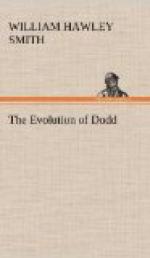The boy’s eyes were full of tears, but he looked up as he was bidden and fixed his eyes on Amos. This was worse than ever, and the teacher was more angry than before.
“See here, I’ll ask you a question, if you are so mighty smart. The book says that the Indian ‘leaned against the tree.’ Now, what is meant by that?”
The question was so sudden and so senseless that “Dodd” essayed no answer. This was Amos’s opportunity.
He waved his stick again—the same being one of the narrow slats that had been torn from one of the double seats in the room, a strip of wood two inches wide, an inch thick, and nearly four feet long—and swinging it within an inch of the boy’s nose, he shouted again: “The book says that the Indian leaned against a tree.’ What does that mean? Answer me!” and again he made the passes and swung the slat.
“I don’t know,” answered “Dodd,” just a little frightened.
It was a little, but it was enough. Amos felt that he had Parson Weaver on the hip and he hastened to make the most of his advantage.
“Do you mean to say that you don’t know what it is to lean against a tree? Why, where was you raised? What kind o’ folks hev you got? Your old man must be mighty smart to raise a boy as big as you be, an’ not learn him what it means to lean ag’in’ a tree.”
It was a savage thrust and it drew blood from the boy.
“My dad may not be very smart,” he retorted, fully forgetting the “lone Indian,” “but he’s got gall enough to pound the stuffin’ out o’ such a rooster as you be.”
There was a sensation in the little school room, a dead pause, so still that the little clock on the desk seemed to rattle like a factory, as it hit off the anxious seconds of the strife it was forced to witness.
This speech of “Dodd’s” was almost too many for Amos. It smote him in his weakest part, and for a moment he was daunted, but he rallied, and with a few wild brandishes of the slat he felt that he was himself again, and once more led on to the fray.
“See here, young man, you mustn’t talk to me like that! Don’t you give me none of your Methodist lip” (Amos was not a Methodist, and, though a candidate for the ministry, he cordially hated all outside his own denomination), “or I’ll make you wish you’d never saw deestrick four. Now tell me what it means to ‘lean ag’in’ a tree,’” and he glared at the boy and waved the slat again.
“Why, it means to lean up against it,” returned “Dodd,” who was bound to do his best. “That’s what I think it means; what do you think it means?”
The tables were turned, and Amos almost caught his breath at the dilemma.
“What do I think it means?” he retorted; “what do I think it means? Why, it means—it means—it means what it says; that he leaned ag’in’ the tree, that is, that he assumed a recumbent posture ag’in’ the tree!”
It was a bold stroke, but Amos felt that it had brought him safely over. “Recumbent posture” was not a vile phrase, and he patted himself on the back, though he puffed a little at the exertion it cost him to hoist the words out of himself.




